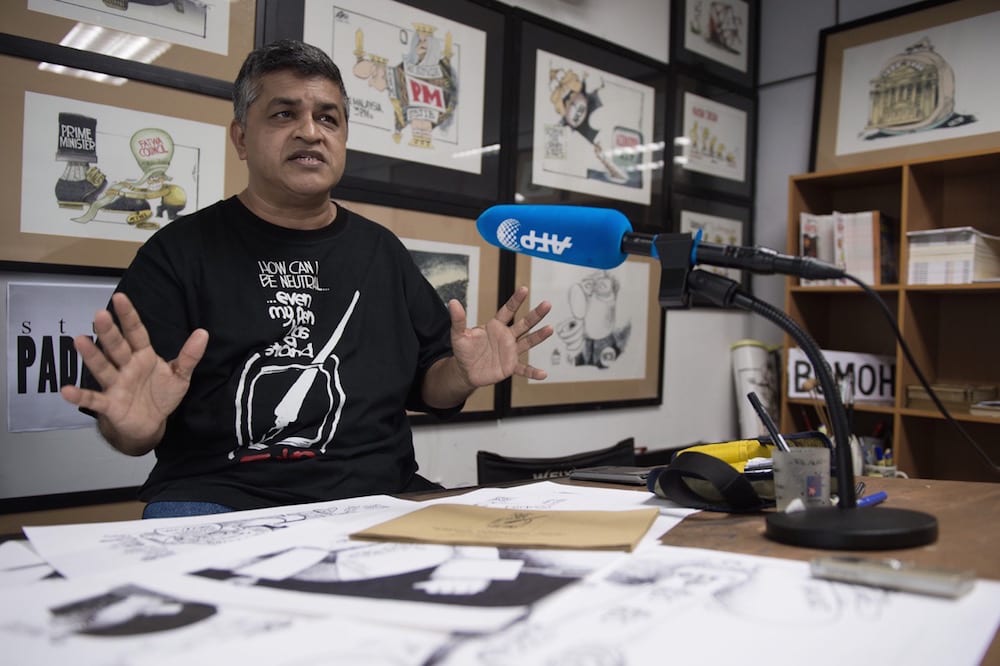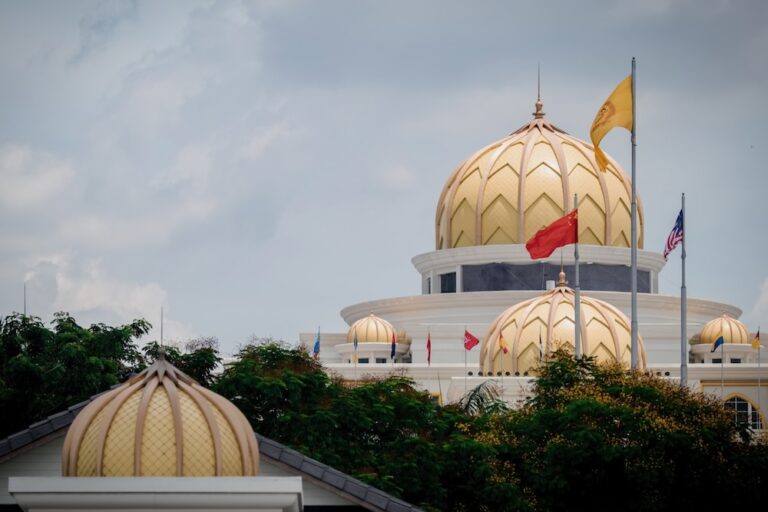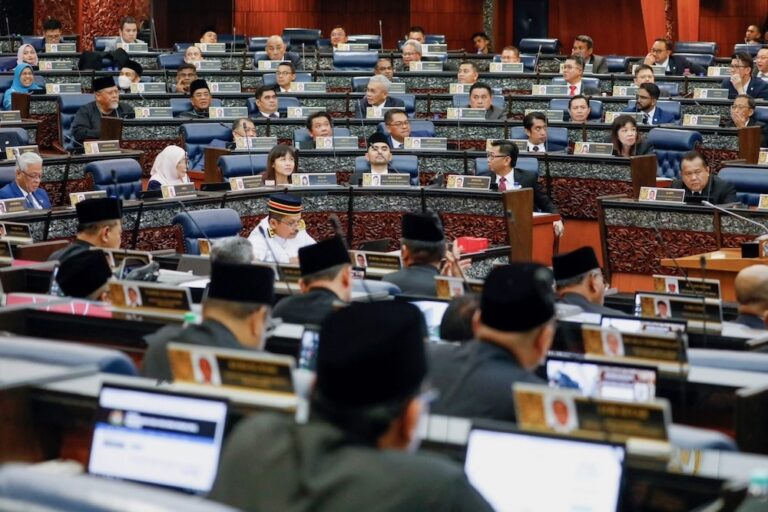Two veteran cartoonists in Malaysia - Fahmi Reza and Zunar - could face possible criminal investigations for their online commentary and artwork.
This statement was originally published on cartoonistsrights.org on 28 April 2021.
As leading press freedom and human rights organizations sound a note of alarm about deteriorating conditions in Malaysia, two veteran cartoonists – Fahmi Reza and Zunar – find themselves facing the possibility of criminal investigation once again.
In March CRNI was aware that the celebrated graphic artist and satirist Fahmi Reza (aka kuasasiswa) had been questioned by police over images posted to Twitter. In the hours immediately afterward he was in a defiant mood, stating that “This latest round of investigations won’t stop me from designing and producing my artwork, because it is part of my responsibility both as a graphic designer and a Malaysian. Whatever I post is part of me expressing my freedom, as a Malaysian, to comment on the current events and as a graphic designer, I make these remarks through my satirical and parodic artworks and designs.”
Fahmi certainly has plenty of past experience dealing with Malaysian prosecutors; he faced criminal charges in 2016 and was finally acquitted in 2018 after the general election that year saw the downfall of Najib Razak’s notoriously corrupt and vindictive federal government.
On the evening of April 23 multiple police officers came to Fahmi’s home in Kuala Lumpur, broke his door to gain entry, placed him under arrest and seized his electronic devices. As in the 2016 case he is being accused of crimes under the Sedition Act, except this time the substance of the case is not quite a piece of visual artwork but rather the title and header image he amended to a playlist created on the Spotify music streaming platform. The Coconuts KL pop culture website explains the context as follows: “[it] appears to be taking a jab at Queen Azizah Aminah Maimunah Iskandariah, who recently teased someone on social media after bragging about getting the vaccine. The playlist, titled This is Dengki Ke (Jealousy), quoted part of the comment she posted online and featured 101 songs with the word ‘Jealous’ in the title.”
At the time of writing the playlist was certainly available outside of Malaysia (despite reports that hundred of strikes against it were sent to Fahmi) and it can be heard below.
On the morning of April 25 police requested four days’ remand but a magistrate denied their petition, saying the cartoonist should be released on bail twenty-four hours after arrest. While his belongings remained confiscated and the investigation continues – specifically, under Section 4(1) of the Sedition Act and Section 233 of the Communications and Multimedia Act – Rahmi was able to meet supporters outside the police station and once again affirmed his dedication to freedom of expression. A note written while still detained and passed to his lawyers said: “In this country where a graphic designer is censored, arrested and locked up for his artwork, it is very important for this creative expression – parody and satire as a form of protest – to be continued to be practiced and to be continued to be defended.” Somewhat reassuringly, comments from the relevant ministry over the weekend indicate that this will be solely a police matter.
In a preview of a forth-coming interview with Vice Asia, Fahmi reflects on these most recent events, saying; “I like to think that my art and activism shines a spotlight on the wrongdoings in our country. But what was my crime? Creating a Spotify playlist. And now I’m being censored for it. It was clearly a show of force on the part of the authorities who came down harder on me this time round, using the kind of tactics reserved for serious criminals.”
Another cartoonist all too familiar with the details of Malaysia’s Sedition Act and who had cause to believe his troubles were over at the end of the last decade was Zunar, a past winner of CRNI’s Courage in Cartooning Award.
Earlier today news broke that Zunar will be required to report for police questioning in the capital of the Kedah region’s Padang Terap district, Kuala Nerang on May 2. Under scrutiny is a cartoon of the regional governor Muhammad Sanusi Md Nor that Zunar posted in January when controversy was caused by the cancellation of a Hindu festival. The cartoon garnered complaints from the local youth wing of the ruling PAS party. It has been reported that formal complaints about Fahmi Reza have come from much the same political quarter.
Speaking today with The Vibes news, Zunar is quoted as saying: “The cartoon was posted long ago – in fact, five months ago – but only now they (police) act? However, we can say this is politically motivated. My cartoon is open to interpretation; it’s something visual where I am commenting on a current issue. But I am not responsible for how people interpret it. Again, we don’t know the actual issue, but this is what the police require. Whatever it is, I have to follow (their instructions).”
In an exchange with CRNI last year Zunar expressed worries about the near future and it looks like these were well-founded; we will monitor what occurs next very closely.
These events come at the end of a few bad months for Malaysia’s reputation on the world stage. The consensus of leading human rights campaigners is that the new government formed in the aftermath of 2020’s “Sheraton Move” crisis has been disastrous for free speech and personal liberties. In their world reports Human Rights Watch said “freedom of expression came under attack immediately after the change in government” and Freedom House said they “invoked the COVID-19 pandemic to justify crackdowns on free speech and movement […] Additionally, a number of journalists, activists, and others were charged during the year with sedition, defamation, or violation of [law] for speech critical or perceived as critical of authorities.” Reporters Without Borders’ appraisal was dire, knocking Malaysia down eighteen places on their World Press Freedom Index.
“I am concerned and saddened by the news we are receiving from Malaysia. It’s become apparent that any ground gained in the brief rule of Parkatan Harapan has now been lost. The heavy-handed actions of Malaysian police and the extent to which they appear to be taking instruction from partisans are shameful and in some instances quite absurd. By definition seditious acts are those committed with the intent of destroying a nation. I refuse to accept that any reasonable interpretation of sedition can include rearranging existing pop songs on Spotify and as such trust the bizarre case made against Fahmi Reza will collapse given time. It remains to seen what specifics await Zunar in his interview with police on May 2nd. We will rally to his defense once more, should it prove necessary.”
Terry Anderson, Executive Director, CRNI



